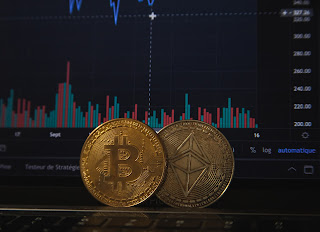Search This Blog
A place for Canadians to learn how to engage with the world of cryptocurrencies, stocks, real estate, and affiliate marketing.
Featured
Coin V.S Token
Almost everyone who has ever used cryptocurrencies has occasionally confused a token with a coin. Coins and tokens actually have a lot of fundamental similarities. Both are capable of processing payments and reflecting value. Coins can be exchanged for tokens and vice versa.
The degree of community involvement determines the value of tokens, just like any other kind of money. When there is more demand than supply, a token increases in value. A token's demand rises when it becomes useful, as more people want to acquire it. Since they intend to use it, nobody wants to sell it.
The utility is the major distinction between these two. Tokens can be used for some purposes that currencies cannot. Some markets, however, only accept coins; they do not accept tokens. When Bitcoin originally appeared, it established the criteria for what constitutes a coin. Cryptocurrencies have distinct characteristics that set them apart from tokens, which resemble conventional currencies.
The following traits characterize a coin, it operates on its own blockchain. A blockchain records all transactions involving its own cryptocurrency. The receipt from an Ethereum payment is added to the Ethereum blockchain. The receipt is added to the Bitcoin blockchain if the same person later pays you back in bitcoin. Every transaction is encrypted for security and is available to every network user. It serves as money as well. Bitcoin was developed specifically to displace conventional currency. Other coins, including ETH, NEO, and Litecoin, were created as a result of the paradoxical appeal of transparency and anonymity. Today, you can use cryptocurrency to buy goods and services from several large firms, like Amazon, Microsoft, and Tesla. Along with the US dollar, bitcoin has just been recognized as a legal tender in El Salvador.
You can earn crypto coins in two different ways by mining them. One is using the Proof of Work mechanism for conventional mining. This strategy is used by bitcoin miners to increase their earnings. The issue with this is that there aren't many Bitcoins available for mining, therefore the task gets harder every day. The second way to acquire coins is by Proof of Stake, which is a more contemporary strategy. It requires less energy and is simpler to do. One of the most popular coins to use this technique is Cardano.
How do tokens work? Tokens don't have a blockchain as coins do. Instead, they run on the blockchains of other cryptocurrencies, like Polygon or Ethereum. BAT, BNT, Tether, and numerous stablecoins like the USDC are some of the tokens that are most frequently seen on Ethereum. Tokens are dependent on smart contracts if blockchain is used to process cryptocurrency transactions. They are a variety of codes that enable user-to-user transactions like payments and exchanges. Smart contracts are used by every blockchain. ERC-20 is used by Ethereum, while Nep-5 is used by NEO.
A token physically transfers from one location to another when it is spent. The trading of NFTs is a prime illustration of this (non-fungible tokens.) Since they are unique items, a change in ownership needs to be handled manually. In a way, NFTs are comparable to utility tokens in that they frequently have only sentimental or artistic value; however, you cannot demand any services in exchange for NFTs. This is distinct from coins because account balances are the only thing that may change with cryptocurrency coins. Your money doesn't move when you transfer funds from one bank to another. The bank updated both accounts' balances while keeping the fees.
What they stand for is another clear distinction between tokens and coins. Tokens can represent either assets or deeds, but cryptocurrency coins are essentially digital copies of money. Coins can be used to purchase tokens, however, some tokens may be worth more than all of them combined. like a stock in a firm. However, a token usually has limitations on where you can use it, so it lacks the liquidity that a coin provides.
Simply said, a coin indicates what you are capable of possessing, but a token indicates what you currently hold.
Long before cryptocurrencies were a thing, there were tokens. It still has very little to do with cryptocurrency today. Everyone has at some point in their lives utilized a "token." A token is a voucher you received in the mail for dinner for two. A token is your vehicle's title. The value of the title is transferred to the new owner when you sell your car. You cannot, however, go to Microsoft and purchase a computer with that title or a meal certificate.
In summary
Although the distinction between a token and a coin is not substantial, if it is routinely disregarded, it can be extremely problematic. Paying close attention to the items you purchase might help you determine which one to use quickly. Most often, you would need coins if it were a product. If it's a service, you can typically utilize utility tokens. It's interesting how using tokens works a lot like using dollars. Cash transactions involve the actual transfer of money from one hand to another. However, we did point out that only coins may be used to represent money and that they are immobile.
More Articles Below
Why do we Invest in Cryptocurrency?









